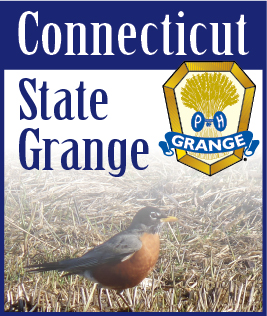 |
|
 |
|
 |
|
 |
 |
| Around The Grange |
|
 |
State Grange: No fair in 2008 |
| |
By Cynthia Hochswender, The Winsted Journal (Nov. 1, 2007) |
| |
NOVEMBER 2007 -- After 39 years, the Connecticut State Grange has voted to discontinue the annual fairs it held in Goshen each summer. The fair was traditionally held on the last weekend in July at the fairgrounds, and should not be confused with the annual Goshen Fair, which is held over Labor Day weekend.
The Goshen and Grange fairs are both classified as "major" fairs, according to Todd Gelineau, president of the Connecticut Agricultural Fair. The Goshen Fair is generally better attended than the Grange fair, he noted, perhaps because it has been around for about 100 years. The two fairs are about the same size, but "we had a larger entertainment schedule with more national acts," Gelineau said.
The Goshen Fair also had the advantage of being held on a three-day weekend; and the Labor Day weekend weather has been more favorable of late.
"We have fought summer wind, rain, heat, mud, hurricanes, lightning strikes and just about everything else short of locusts during our summer dates," Gelineau wrote in an article published in the November issue of the Connecticut Granger, a newsletter that goes out to Grange members statewide. "Had we held a fair on our normal dates this year, we would have had identical results. Pouring rain in the middle of both Saturday and Sunday afternoons along with heat and humidity. That would have bankrupted us."
The Grange had already decided to suspend the fair this summer, after losing a substantial amount of money in 2006.
"We were devastated by last year's fair," Gelineau said. "We lost better than $20,000."
As for Goshen, it does not expect to feel a significant financial impact from losing the Grange Fair.
"They were a big client, but they don't represent much of the financial impact on our budget," said John Ross, president of the Goshen Agricultural Society, which owns the fairground. "Other venues have taken their place this year. For the first time there was a Tibet fest, for example."
This year, Grange members discussed alternatives to their fair, including one plan to put on a fall festival with the Windham Agricultural Society on Columbus Day weekend. At a meeting on Sept. 29, Grange members voted against the proposal.
"We opted not to do it," Gelineau said. "We were concerned about being able to hold up our end financially and in terms of volunteers."
The Goshen Fair, he said, is staffed by Goshen community members at their "home" fairgrounds. The Grange rented the fairgrounds and had to recruit volunteers to come from all over the state, a task that has become increasingly difficult over the years. Granges remain important organizations, Gelineau maintains, but their membership is shrinking.
"We face the same problems as other membership-based organizations like the Elks, where there is a graying of the membership," he said. "It's difficult to get younger families involved because of the myriad things you have to do with a young family. When people don't even have time to mow the lawn, it's hard to get them to volunteer at a pancake breakfast or come to Grange meetings."
The National Grange has about 300,000 members, he said. Connecticut has about 3,000. Two of the strongest local groups are the Tagghanuck Grange in Sharon, and Winchester Grange 74, "which is one of the largest granges in the eastern United States," Gelineau said.
"The Grange has been around since 1867," Gelineau said. "It was founded after the Civil War as an effort to unite the North and South again, especially agriculturally. It has evolved into a community service organization and each organization decides how best they can fulfill the needs of their area."
For now, the local Granges will concentrate on finding new ways to revitalize their membership; and on making plans for the National Grange convention, which will be held in 2008 in Connecticut (in the town of Cromwell) for the first time since 1972.
"That's a very large and expensive undertaking," Gelineau said, "so all our focus is on that."
|
| |
|
| |
|
Your rating has been saved
|
|
|
|
|
|
|
 |
| |
 |
|
|
|
|
